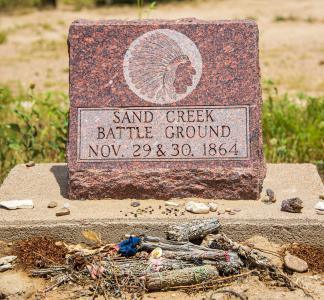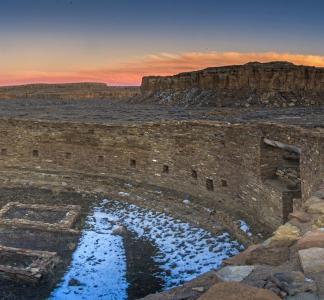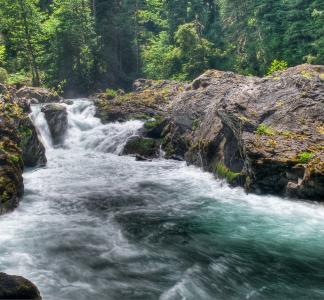Confirmed: New Interior Secretary Deb Haaland makes history

Then-Rep. Deb Haaland at an event in support of climate action in 2019
Kalita Conley, Moms Clean Air Force, Flickr
1st Indigenous-descended person in confirmed Cabinet post
More than 700 people have been confirmed to serve at the helm of modern Cabinet-level agencies in U.S. history. But until this week, nobody descended from North America’s Indigenous peoples was among them.
With bipartisan support, Interior Secretary Deb Haaland was confirmed as the 54th Secretary of the Interior on March 15. In addition to her extensive qualifications as a champion of public lands, climate action and increasing access to the outdoors, Secretary Haaland, a member of the Laguna Pueblo Nation, will bring sorely needed perspective to an agency that has been responsible for exploiting and mistreating Indigenous peoples and their lands.
The Department of the Interior is currently tasked with managing the federal government’s Indian trust responsibilities--a legal obligation that includes guaranteeing the protection and safety of Tribal lands and resources (for example, ensuring access to fish, game and sources of clean water). Secretary Haaland has been hailed a strong advocate on those issues. As Amy Besaw Medford, a Harvard researcher who is a member of the Brothertown Indian Nation and of Menominee descent, recently put it, Secretary Haaland is “the first Native woman who will be responsible for policies that will affect Native American communities.”
“Secretary Haaland is uniquely equipped to modernize the Interior Department, and turn the corner on decades of discrimination against Native Americans and their tribal nations" -Jamie Williams, president of The Wilderness Society
“Secretary Haaland is uniquely equipped to modernize the Interior Department, and turn the corner on decades of discrimination against Native Americans and their tribal nations," said The Wilderness Society President Jamie Williams in a statement. "We look forward to working with Secretary Haaland and the Interior Department to take on these opportunities to solve our climate crisis in an equitable and just manner.”
Secretary Haaland has previously said she would work to undo public lands policies that have led to a shortsighted focus on fossil fuel development, instead expanding renewable energy production. Fossil fuels drilled and mined on public lands account for nearly one-quarter of U.S. greenhouse gas emissions, and experts say addressing such development would be an important step in confronting climate change.
Additionally, Rep. Haaland has been a leader in pushing the U.S. to embrace a national goal of protecting 30 percent of lands and waters by the year 2030, which scientists say will help stem the ongoing extinction crisis and deterioration of the natural world.
Key accomplishments of new Interior Secretary Deb Haaland:
-
Was an original cosponsor of a bill directing the Department of the Interior and U.S. Forest Service to achieve net-zero greenhouse gas emissions from public lands and waters, recognizing the key role of fossil fuels extracted on public lands in driving climate change.
-
Introduced a House resolution to adopt a goal of protecting 30 percent of U.S. lands and waters by the year 2030, a widely touted target based on scientists’ recommendations for responding and adapting to climate change and curbing the extinction crisis.
-
Introduced legislation that would set the stage for reviewing and potentially changing offensive and racist names of parks, national forests, wilderness areas, monuments, mountains, rivers and other places.
-
Was an original cosponsor of a bill to restore and expand protection of Bears Ears National Monument, which was unlawfully reduced by President Trump. The measure would protect the full area originally proposed by the Bears Ears Inter-Tribal Coalition, an alliance of five sovereign tribal nations: the Navajo Nation, Hopi Tribe, Ute Indian Tribe, Ute Mountain Ute Tribe, and Pueblo of Zuni.
-
Introduced legislation to protect Chaco Canyon from harmful oil and gas drilling around the park. Chaco Canyon was a major center of Ancestral Puebloan culture and the area includes important archaeological sites and structures that are among the most significant intact examples of pre-Columbian culture.
-
Cosponsored a bill to permanently fund the Land and Water Conservation Fund, which is considered a crucial tool for guaranteeing access to public lands and helping ecosystems and communities mitigate and adapt to the effects of climate change.
-
Cosponsored legislation to improve the permitting system for outfitters, guides and others who lead activities on national parks and other public lands.
-
Spearheaded a bill to establish Cerro de la Olla Wilderness within the Río Grande del Norte National Monument in northern New Mexico. The measure aimed to preserve traditional uses and access for the people of the Taos area, who have been hunting and gathering herbs in the area for hundreds of years.
-
Cosponsored the America’s Public Land Act, a move to prohibit the Department of the Interior and Department of Agriculture from selling public lands or giving management authority to state officials. The bill was a response to fringe anti-conservation beliefs that ended up heavily informing the policy views of the Trump administration.




